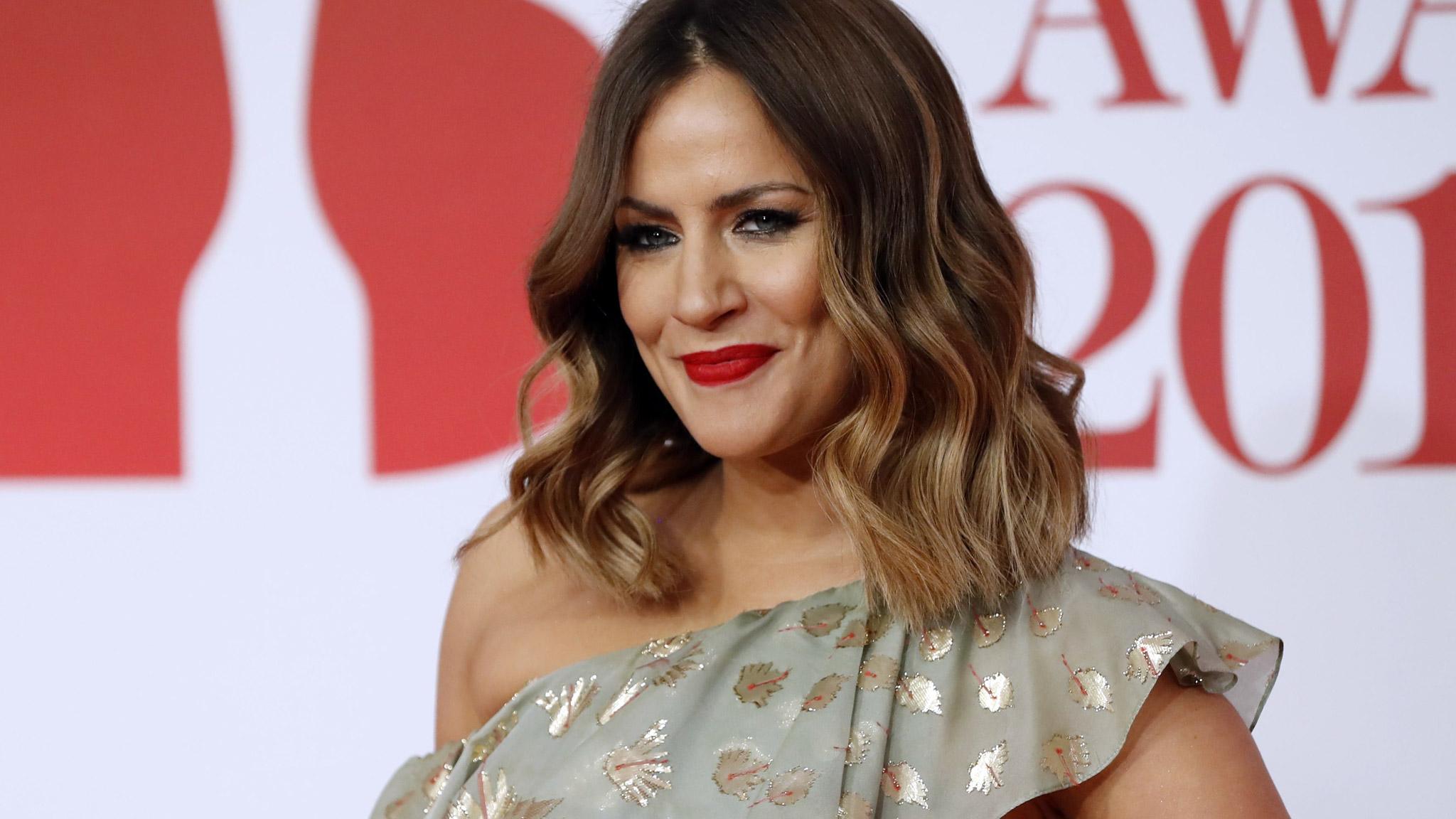Caroline Flack 'wasn't emotionally wired' for fame
- Published

Caroline Flack took her own life in February 2020
Caroline Flack was known as one of the most excitable and charismatic presenters in television. But a new documentary reveals a complex picture of a celebrity who was struggling enormously beneath the surface.
At the time of her death in February 2020, Flack was awaiting trial for assaulting her boyfriend, Lewis Burton. The Crown Prosecution Service said it had cause to pursue the case, but the subsequent publicity placed immense pressure on someone who, according to her family, had always been vulnerable.
Flack was somebody who revelled in life's highs; she adored her job, had no shortage of friends, and, by her own admission, loved being in love. But she also experienced crushing lows, particularly when it came to break-ups. The TV presenter had a long history of harming herself when a relationship ended, something which hasn't previously been made public.
"She struggled emotionally, she was very depressed," her twin sister Jody says in the documentary, which will air on Channel 4 next week. "That pattern carried on forever. She really did find heartbreak impossible."
Jody says the family had often been concerned for her welfare in the past. "She was quite fascinated by the subject of suicide always, and I knew that about her, so it was a worry for a long time, and something I tried to get my head around for a long time. So it's something that's in my life that I'm prepared could happen."

If you are affected by issues raised in this article help and support is available via the BBC Action Line.
If you or someone you know needs support for issues relating to bereavement and emotional distress, these organisations may be also able to help.

Previous break-ups had left Caroline Flack in hospital following self-harm or suicide attempts. Her mother Christine recalls one episode in the 1990s, when her daughter was in her late teens and studying musical theatre. "She had a long relationship when she was in Cambridge, but it ended, and then we got a call that she'd taken some pills, and she spent time in hospital.
"You could tell that it wasn't right. Her reaction wasn't right. She didn't handle heartbreak well. We went through all the doctors and they said, 'We think it was a one off.' But there was always that fear after then, you're always worried in case anything happened.
"You know you get a high or a low, and that's what she was like from a child, she was either very high or she was very down, she couldn't stop crying."
Jody adds: "Each serious boyfriend, she took a lot of tablets, drank a lot, ended up in an A&E situation a lot of times. And she really didn't think she could cope with that feeling. And so I think it was her trying to control it."
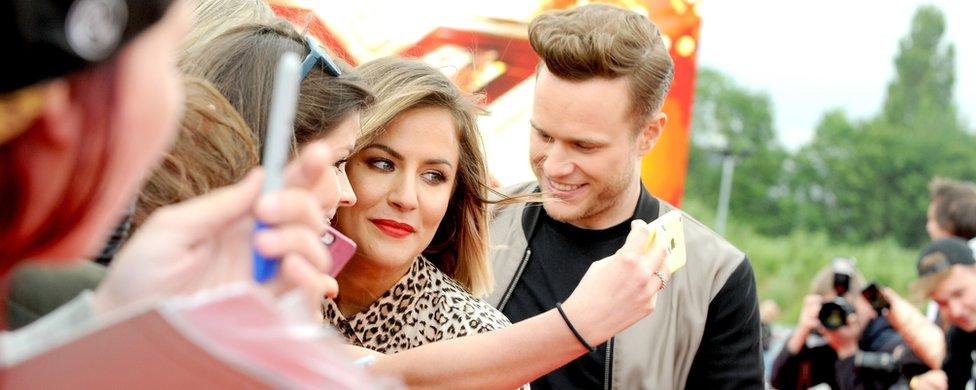
Flack co-hosted ITV2's The Xtra Factor with Olly Murs, before the pair were promoted to fronting the main ITV series
The documentary also features interviews with Dermot O'Leary and Olly Murs, who co-hosted The Xtra Factor with Flack on ITV2 for several years.
"She was exceptionally good," says O'Leary. "You've got to have a good personality in television. All the traits you need - you've got to be reactive, reactively funny, have empathy, ask the right questions. But there's a whole technical side too, which you can learn, but [Caroline] just had it, she was a great live presenter. She had funny bones.
"The Xtra Factor was my favourite thing she ever did, she just made it fly. She was great on Love Island, but she could do Love Island in her sleep. The Xtra Factor, those live shows, she really just came alive."
Flack and Murs were hugely popular with viewers thanks to their easy natural chemistry. It was only a matter of time before the call came to promote them to The X Factor on ITV, which it did in 2015. But for some reason, the pair struggled to carry their sparkle across to the main show.
"It should have been the most amazing experience of our lives, but it ended up being our downfall really," Murs recalls. "After the first two or three shows, we got it from all angles. And all of a sudden you're beaten up, beaten up again. That was constant for 10 weeks. The abuse that she was getting, it was awful. Those comments did affect her every day.
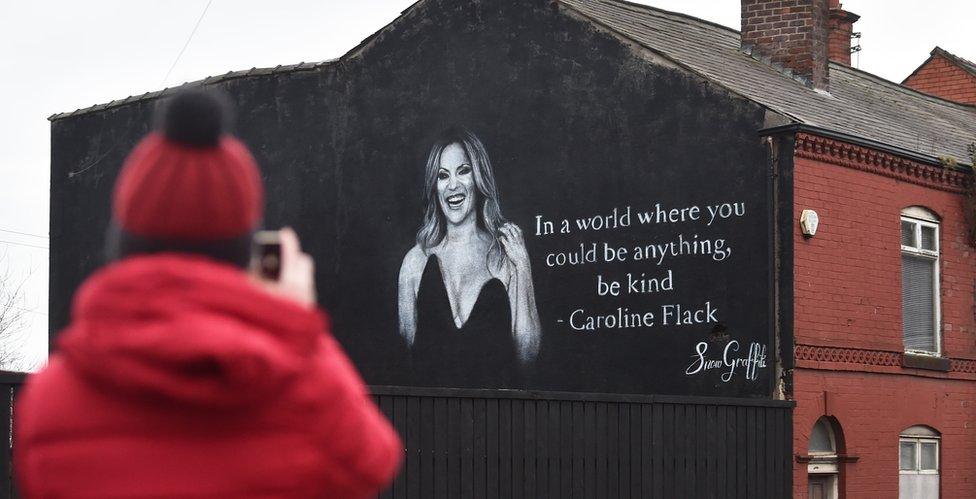
A mural by artist Scott Wilcock was painted in Wigan last month on the anniversary of Flack's death
"I remember the final of The X Factor, there was a big story, and basically we were getting sacked from the show. It was an awful experience, to know that everyone hated us on the show."
Of course, part of being in the public eye is having to take criticism as well as praise. But Flack found this aspect of fame particularly challenging.
TV producer Anna Blue says: "Sometimes people ask if she wanted to be famous, which is a really good question. And she did want to be famous, but she just wasn't emotionally wired to deal with all the problems that came with being famous."
Flack would read news stories about herself and constantly monitor her notifications on social media - taking any mean comments to heart. "You can't get away from it, it follows you home, it follows you on your phone," Christine Flack points out. "And Carrie was the worst one, she'd look at her phone all the time, it took her over, what was being said."
Flack's anxiety about the public's perception of her led to significant efforts to hide information from the press. Christine says her daughter "went to different doctors all the time", so nobody could find out about it.
"She was so fearful of anybody knowing anything and printing it," Christine explains. "She wasn't perfect, but she didn't have any bad in her. I can't imagine her writing a nasty thing about someone. And everything that was written about her hurt her. And we'd say, 'Don't read it.' But it's so easy to say, because you do read it, don't you?"
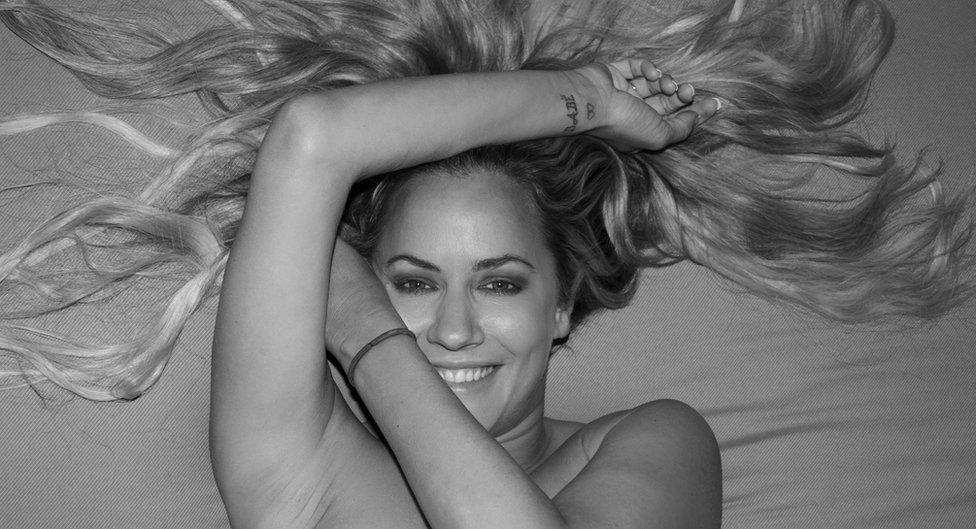
The documentary, Caroline Flack: Her Life and Death, is broadcast on Channel 4 next week
In the weeks preceding her death, a graphic photo of blood-stained sheets in Flack's bedroom, taken immediately after her fight with Burton, was printed by some newspapers.
Some suggested this was evidence of the attack on Burton, but in an Instagram statement Flack had written prior to her death, she said: "The blood that someone SOLD to a newspaper was MY blood and that was something very sad and very personal."
Christine says her daughter "had to have plastic surgery on her arm" due to the damage she'd inflicted on herself, adding: "She did do that when she got really low."
She expresses disbelief at the lengths the press would go to for stories. "They followed me across London one night, after I'd cleaned up the blood in Carrie's flat. That's how bad they were. And that was before she died."
The looming public court case, which was bound to be a media circus, contributed to the immense pressure on her. "I think she realised that everything was going to be in the press, and everyone was going to find out she had these dark moments, and she didn't want people to know that."
At the time of the alleged attack, Burton said he did not want to press charges against Flack. But the lawyer who was in charge of prosecuting her for assault has previously said it was the right decision to pursue the trial, and that Flack's subsequent death could not have been anticipated.
"You've got to come to a decision as a prosecutor, you've got to do what you think is right," said Ed Beltrami, who at the time was chief crown prosecutor in north London. "You cannot do what you think is popular."
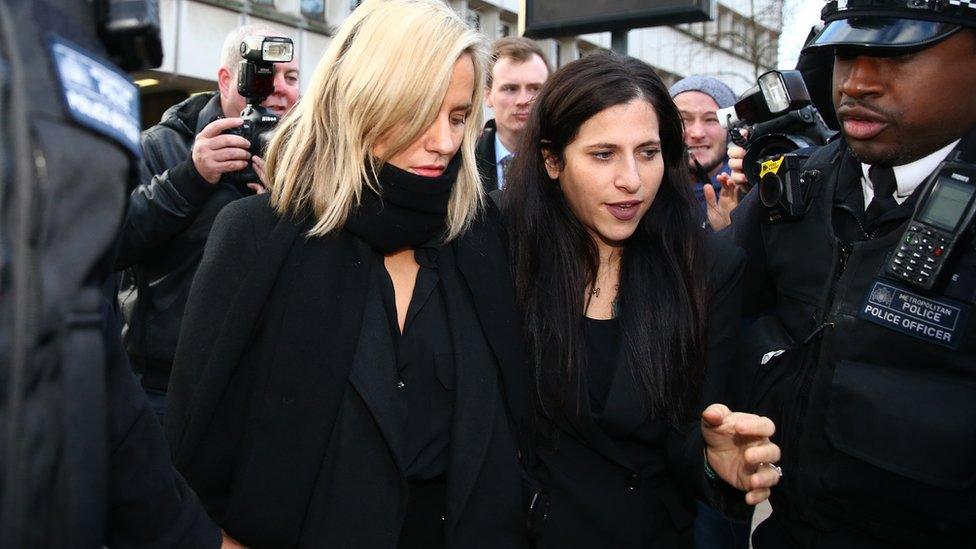
Flack appeared at Highbury Corner Magistrates' Court two months before taking her own life
"The facts of this case were the guy had made his complaint, he had phoned the police, he was terrified he was going to be killed, he's been hit over the head with a weapon, namely a lamp, he's got a cut to his head, and she's made an admission to the police at the scene."
The thought of all the details of the case being made public was something Flack couldn't deal with, her mother says.
"Someone else could've probably dealt with it, but she couldn't," Christine reflects. "She just hated the thought that people thought she was this awful person. Even when she'd taken pills as a young person, she didn't want anyone to know she got down. And I know they say, 'Everyone's talking about it now.' But I think a lot of people with depression don't talk about it. You're either ashamed of it, or you're frightened that they'll think something about you. So I think people are still frightened to say it."

Caroline Flack: Her Life And Death is broadcast on Wednesday 17 March at 21:00 GMT on Channel 4.
Related topics
- Published6 August 2020
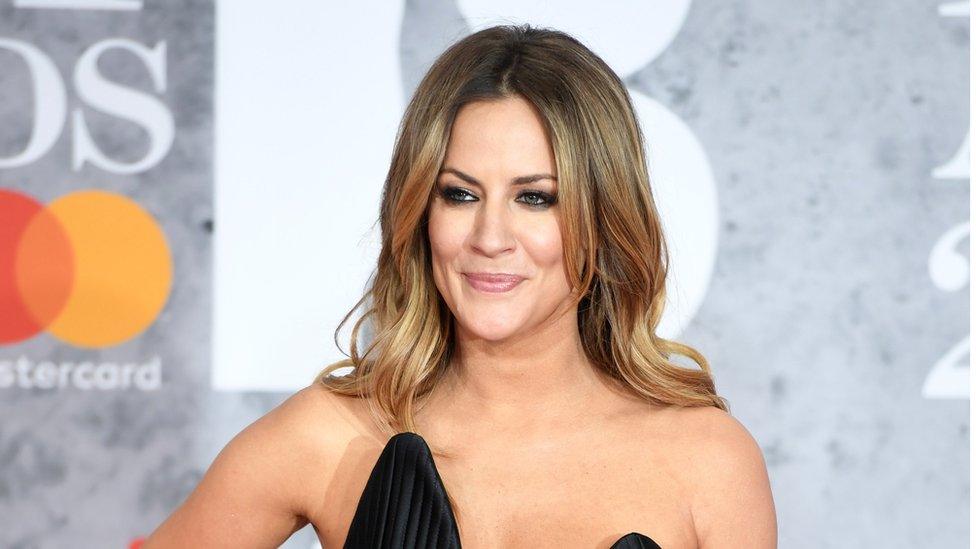
- Published15 February 2021
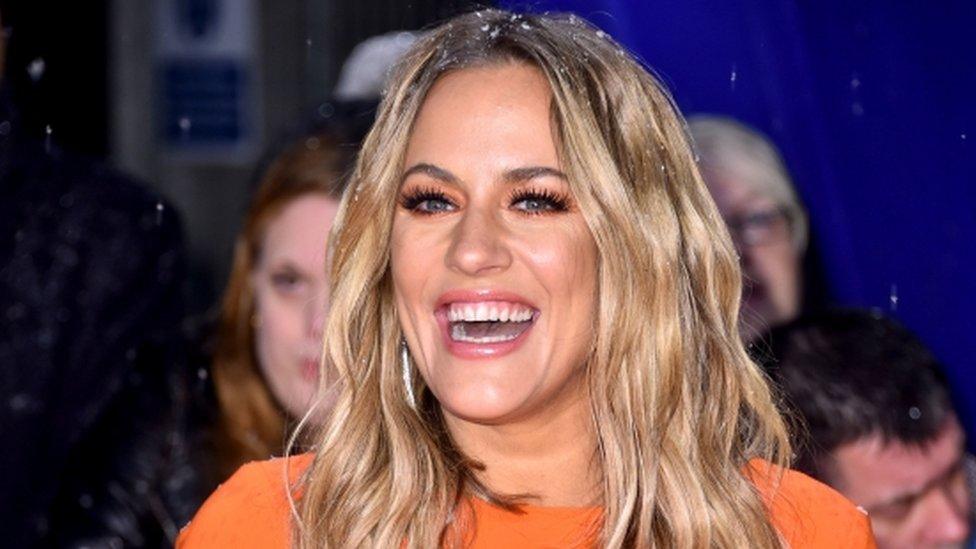
- Published18 February 2020
